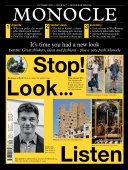
Issue 147
Monocle’s October issue is all about new looks. From our style special to features about the businesses and industries to watch, we look at what’s happening around the world and what’s ahead. Inside you’ll find big interviews, thought-provoking arguments, long reads and stunning photography. Expect insights from experts on world affairs, design and the up-and-coming places to put on your next travel itinerary. Plus: our autumn culture preview, the season’s best fashion from Paris and Tokyo, and the shops and restaurants to seek out wherever you go.
In This Issue
Oops! No content was found.
Looks like we no longer have content for the page you're on. Perhaps try a search?
Return Home

